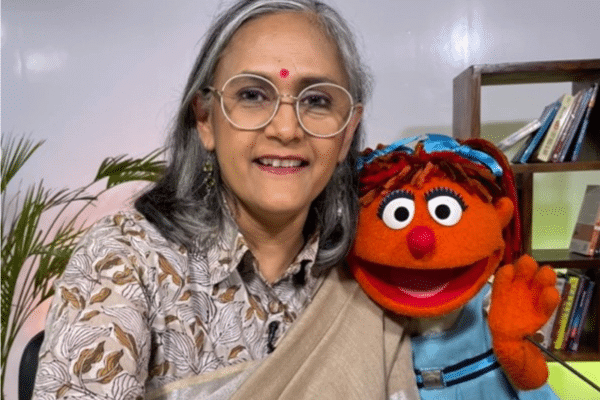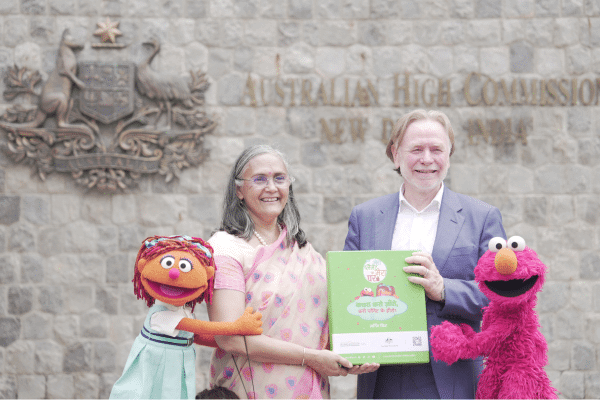Imagine a classroom where children learn how to combat climate change, not through dull lectures but by singing songs, planting saplings, creating crafts from waste materials, and pledging to conserve water — all with the help of Sesame Street’s beloved muppet characters like Elmo and Chamki.
This is the essence of ‘Mera Planet, Mera Ghar’, an environmental initiative launched by Delhi-based Sesame Workshop India Trust (SWIT) in 2021. This campaign aims to instill environmental consciousness in over 200 children aged 5-12 years old from Delhi’s government schools, while also reaching millions of adults through digital platforms. As the campaign scales, its innovative framework has the potential to inspire similar sustainability programs in Australia and beyond.
How, you ask? SWIT has recently forged a collaboration with the Australian High Commission.
“At Sesame Workshop India, we believe in partnerships that amplify our impact,” says Sonali Khan, managing trustee, SWIT. “The Australian High Commission’s focus on sustainability aligns seamlessly with our mission to educate and empower children. Their support allows us to scale the campaign further, introducing innovative resources and activities to engage children and communities more effectively.”
This collaboration also brings an international perspective, showcasing that environmental issues are global challenges requiring collective action.
#Climate change is one of the most critical issues of our time, & it is essential younger generations are part of the conversation. Enjoyed collaborating with @SesameWrkshpIND for their campaign to build environmental stewardship in young children. Watch
https://t.co/mDeqmLE59R pic.twitter.com/bz2c94IzHQ
— Philip Green OAM (@AusHCIndia) October 26, 2024
Creating climate champions
Khan says that the idea for ‘Mera Planet, Mera Ghar’ came from the recognition that children are among the most vulnerable to the effects of environmental degradation, yet their voices are rarely part of the conversation.
“For example, air pollution in urban areas isn’t just a vague statistic—it’s the reason why so many children are falling sick with respiratory issues. Unsafe waste disposal and water scarcity are creating daily struggles for families, especially in low-resource communities,” she says.
“Children may not be decision-makers yet, but they can be powerful influencers. By teaching them simple actions like conserving water, recycling, and planting trees, we’re giving them tools to care for their surroundings while building a sense of agency and hope for the future.”
The campaign incorporates a mix of interactive and playful activities designed to resonate with children. Storytelling sessions featuring beloved Sesame Street characters are central to the initiative. These sessions teach kids about topics like recycling, saving water, and planting trees through relatable narratives.
“We have activities where children create ‘environmental pledge boards’ to take home and share with their families, fostering collective action,” Khan shares. “The inclusion of muppets like Chamki and Elmo adds an extra layer of excitement, simplifying complex topics and making it enjoyable for kids. By combining learning with play, we aim to leave a lasting impact.”
Because when learning is fun, it becomes memorable!
View this post on Instagram
Change begins at home
A major focus of the initiative is to influence children’s behaviour beyond classrooms – starting from their homes.
“Children are natural influencers within their families. When they learn something exciting or important, they naturally share it at home,” Khan feels.
Through the campaign, SWIT provides simple, actionable steps that children can introduce into their daily routines, like turning off taps while brushing their teeth or reusing materials for crafts.

“We’ve also created resources specifically for families, such as DIY activity kits that encourage parents and children to work together. For example, a family might create a compost bin or upcycle old items into something new. By making sustainability a shared experience, we’re fostering stronger bonds while promoting eco-friendly behaviour,” she adds.
Since its inception in 2021 in Delhi, ‘Mera Planet, Mera Ghar’ has integrated essential environmental lessons into the daily learning experiences of more than 11,000 children in schools and over 25 million individuals over social media, emphasizing sustainable practices and active environmental leadership.
“Government schools in Delhi have shown tremendous enthusiasm for the program. Teachers recognize the importance of environmental education and appreciate the practical, ready-to-use materials provided by the campaign.”
The team is now exploring partnerships with educational boards and policymakers to embed sustainability lessons into mainstream education.
From India to Australia
How could this initiative be adapted in Australian schools, we ask.
“The beauty of the ‘Mera Planet, Mera Ghar’ model lies in its flexibility—it’s designed to be replicable across geographies while addressing specific environmental challenges. Environmental issues may be universal in scope, but their manifestations are always local,” Khan points out.
“For Australian schools, this means focusing on the pressing challenges their communities face, such as water conservation during droughts, managing bushfire risks, or preserving native wildlife.”
The program would adapt by emphasizing local solutions to these issues.
“For instance, teaching children how to save water during dry spells, involving them in bushfire preparedness activities, or engaging them in tree-planting initiatives to protect koala habitats. These solutions would reflect the realities of their surroundings while keeping the core themes of sustainability and stewardship intact.”
The goal is to inspire – not overwhelm – children, she highlights.
“Celebrate small wins, like students adopting a new eco-friendly habit, to build momentum and enthusiasm for larger initiatives.”
Khan feels that programs like ‘Mera Planet, Mera Ghar’ have the potential to create a ripple effect, and thus it can be taught beyond Indian and Australian classrooms.
“Partnerships, such as the one with the Australian High Commission, open doors for cross-cultural collaboration and expansion into new regions. We envision ‘Mera Planet, Mera Ghar’ becoming a blueprint for similar campaigns worldwide, adapting to local contexts while maintaining its core message of sustainability. With every child and family we reach, we’re building a movement that’s not just about protecting our planet today but ensuring a brighter future for generations to come,” she says.
READ ALSO: Mum and daughter caring for nature, one book at a time






